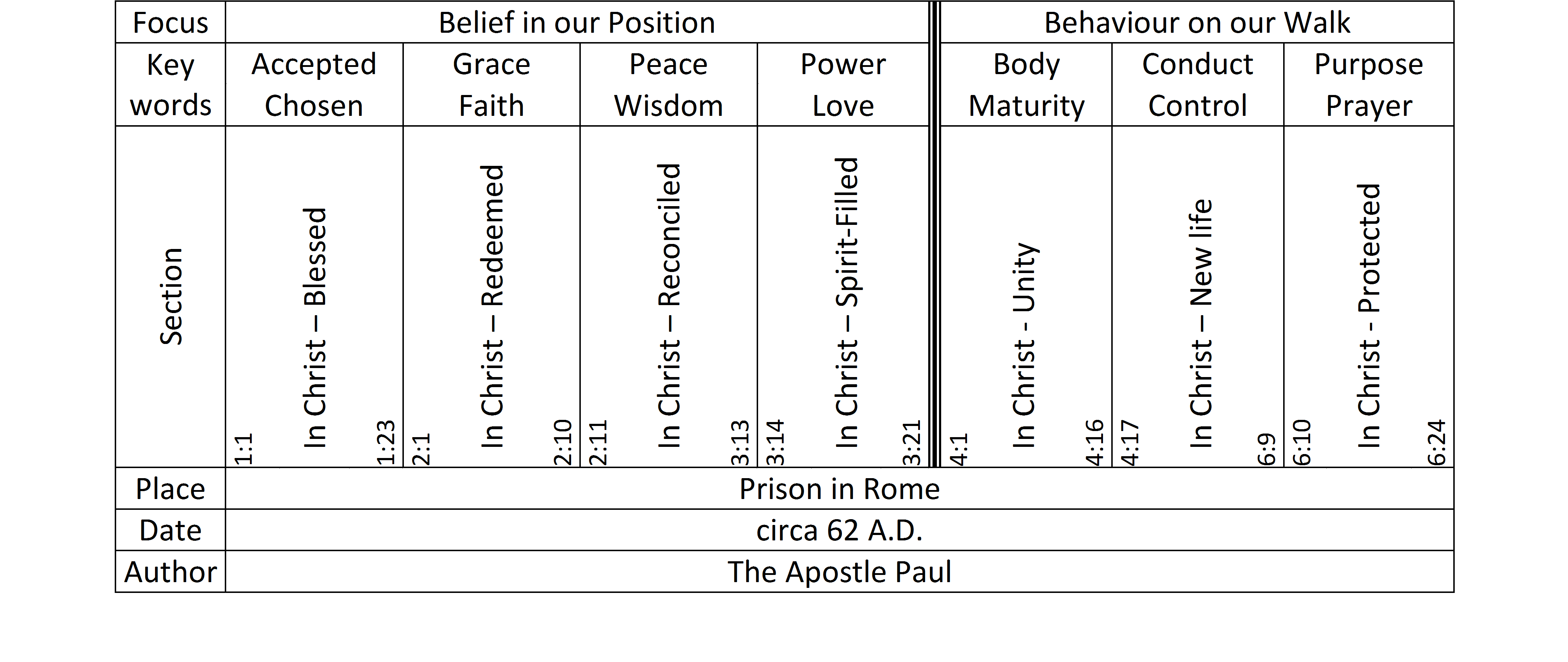Introduction:
2Ti 3:16 NIV All Scripture is God-breathed and is useful for teaching, rebuking, correcting and training in righteousness,
All of Scripture has the power to breathe God’s life into each and every one of us. However, there are some books, such as Ephesians, that seem to have greater relevance to our present situation than others. There is a strong sense in which it could have been written to a 21st century church rather than a 1st century one. Ephesians is about us! Paul seems to be speaking directly to me when he says that out of His love God chose us before time began (1:4). And even more to the point, God has lavished (yes – lavished!) His grace upon us and forgiven us through the blood Jesus the Christ (1:7-8).
It’s almost as if Paul knew everything about the current condition of our Church culture, and the problems we are facing today. When John Stott wrote his classic commentary on Ephesians in 1979, the title he gave it was “God’s New Society”. Not only does Ephesians address the individual Christian, but Paul is at pains to show how we must change our attitudes to one another and modify our behaviour as a body of believers. If ever there was a time when the church needed to give the lead in ushering in the kind of society that God envisions, surely now is that time. In just about every sphere, Western civilisation is in a total mess, and is in need of hearing the message that the Apostle Paul delivers in his letter to the Ephesians.
Schematic Outline:
Background [i]:
In 1 Cor. 16:9, Paul says that he will stay in Ephesus “because a great door for effective work has opened to me” (NIV). This tells us where first Corinthians was written, probably during his first year in Ephesus, but before the riot described in Acts 19:21-41. Paul spent three full years in Ephesus (Acts 20:31; probably c. 52 – 55 A.D.) and founded its thriving church.
After leaving Ephesus in 55 A.D., Paul went back to Corinth and wintered there. (There, he wrote the letter to the Romans, in which he stated that Priscilla and Aquila risked their own necks for his life. Apparently, this took place at Ephesus. There is a tradition, found in several traces, that Paul had an encounter with a lion at Ephesus. This tradition dates from the mid-second century A.D. Yet, Acts is silent about any of these things.) He then headed for Jerusalem by boat, where he was taken captive by the Romans because the Jews rioted when they saw him in the Temple. He then appealed to Caesar and was brought to Rome in around 59 or 60 A.D.
Recipients:
Some scholars have tried to cast doubt on the “to God’s holy people in Ephesus” found in verse 1. However, “the words ‘To Ephesus’ are clearly at the top on the oldest manuscript, p. 46, contained at the University of Michigan Library”[ii]. In addition, the majority of the early church affirmed that the letter was written to the church in Ephesus.
That said, there is also the strong possibility that this letter would have been circulated to the churches at Laodicea, Colossae and over the whole of modern-day Turkey. In turn, Paul’s letter to the Colossians and the letter to the Laodiceans (now lost but mentioned in Col. 4:16) would have been read in Ephesus. Hence we can state that this letter was read more widely than “to God’s holy people in Ephesus” might suggest.
To “dig deeper”, CLICK HERE to download the full article.
[i] Adapted from http://truthsaves.org/bible-book-outlines/outline-of-ephesians/
[ii] ibid.

